-
 Published: Dec 19, 2025
Published: Dec 19, 2025
-
 8 min. read
8 min. read
-
Summarize in ChatGPT
-
 Matthew Gibbons
Matthew Gibbons Senior Data & Tech Writer
Senior Data & Tech Writer
- Matthew Gibbons is a Senior Data & Tech Writer at WebFX, where he strives to help businesses understand niche and complex marketing topics related to SEO, martech, and more. With a B.A. in Professional and Public Writing from Auburn University, he’s written over 1,000 marketing guides and video scripts since joining the company in 2020. In addition to the WebFX blog, you can find his work on SEO.com, Nutshell, TeamAI, and the WebFX YouTube channel. When he’s not pumping out fresh blog posts and articles, he’s usually fueling his Tolkien obsession or working on his latest creative project.
Table of Contents
- 1. Customer service chatbots
- 2. Content creation
- 3. Predictive analytics
- 4. Sentiment analysis
- 5. Smart bidding
- 6. Fraud detection
- 7. Recruitment and HR screening
- 8. Document summarization
- 9. Meeting notes and transcription
- 10. Industry use cases
- Apply AI examples in business with help from WebFX
- FAQs about AI in business
AI tools allow you to do a lot of things you couldn’t do previously, or at least make those things easier. So, it’s not surprising that 88% of businesses use AI for at least one business function.
While you might have heard about AI’s impact on companies in broad terms, you might still be unsure of what that looks like in practice. What are some specific AI examples for business? What types of tools do companies use, and how do they use them?
That’s what we’ll discuss on this page. We’ll go over 10 different AI uses in business, including:
- Customer service chatbots
- Content creation
- Predictive analytics
- Sentiment analysis
- Smart bidding
- Fraud detection
- Recruitment and HR screening
- Document summarization
- Meeting notes and transcription
- Industry use cases
Want to stay on top of marketing industry updates? Be sure to subscribe to Revenue Weekly, our email newsletter, for more helpful info about business and marketing strategies!
1. Customer service chatbots
Our first business AI example is that of customer service chatbots. You’ve no doubt visited websites that have a little chatbot pop up in the bottom corner of the screen:
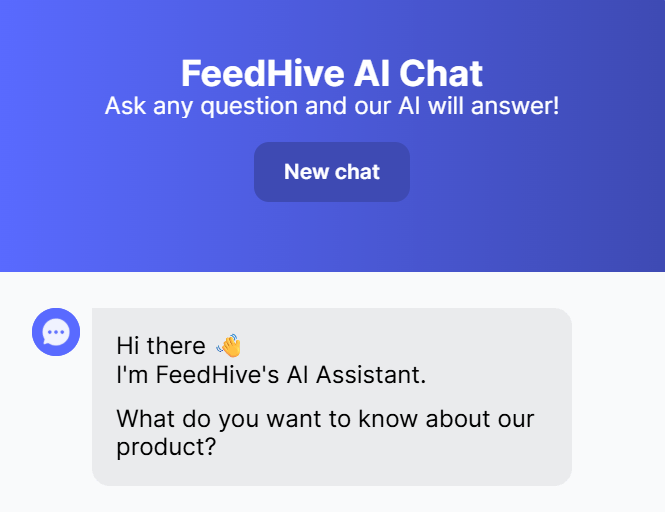
Those chatbots can work in different ways — traditionally, you might have a bot that provides a limited range of responses, or you might have an actual person communicating through it.
With AI, though, you can find the middle ground. Generative AI allows you to create chatbots that respond to users’ questions in a much more helpful, personalized way than traditional bots, simulating what it’s like to talk with an actual representative.
Of course, you have to be careful to train them so that they don’t respond incorrectly. If you’re looking to build a strong online presence, researching the best community chat platforms can help you connect with your audience effectively.
2. Content creation
Another of the best AI examples in business is content creation. Now, there are two camps that businesses fall into on this issue.
A lot of businesses have decided to just let ChatGPT write all their content for them, eliminating the human element almost entirely. We want to be clear here — don’t do that. AI just isn’t reliable enough for you to be handing your entire content strategy over to it.
Having said that, AI can still be a great business tool for your content creators, and that’s how a lot of businesses are approaching it. A blog post writer, for example, might use AI to help them generate an initial outline.
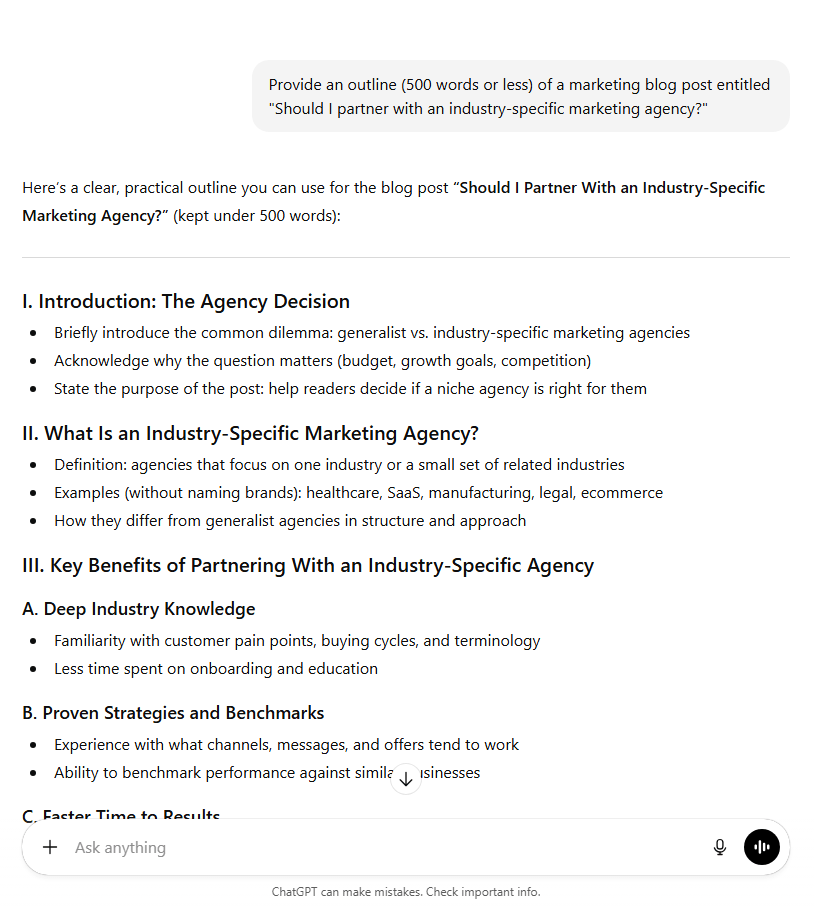
Then they would take that outline, edit it, and use it to create the actual blog post themselves.
3. Predictive analytics
AI is especially helpful when it comes to analyzing large amounts of data. Many types of data tools now include AI features for generating reports and providing insights that it would take you much longer to create manually. In particular, AI is effective at enhancing your predictive analytics.
Predictive analytics is when AI looks at past data to predict what will happen in the future. For example, it might analyze your past spending patterns to predict how much you’ll end up spending in the coming quarter. Not only does it have the potential to generate more accurate predictions than you could do manually, but it can also do it much faster.
4. Sentiment analysis
Another type of analytics that AI can help with is sentiment analysis. That’s where AI analyzes the feelings and attitudes of your leads and customers. Typically, it does this by analyzing transcripts of phone conversations and meetings you have with potential clients.
You’ve likely seen an example of this with Grammarly’s tone detection feature, which uses key phrases and structures to determine how your text sounds:
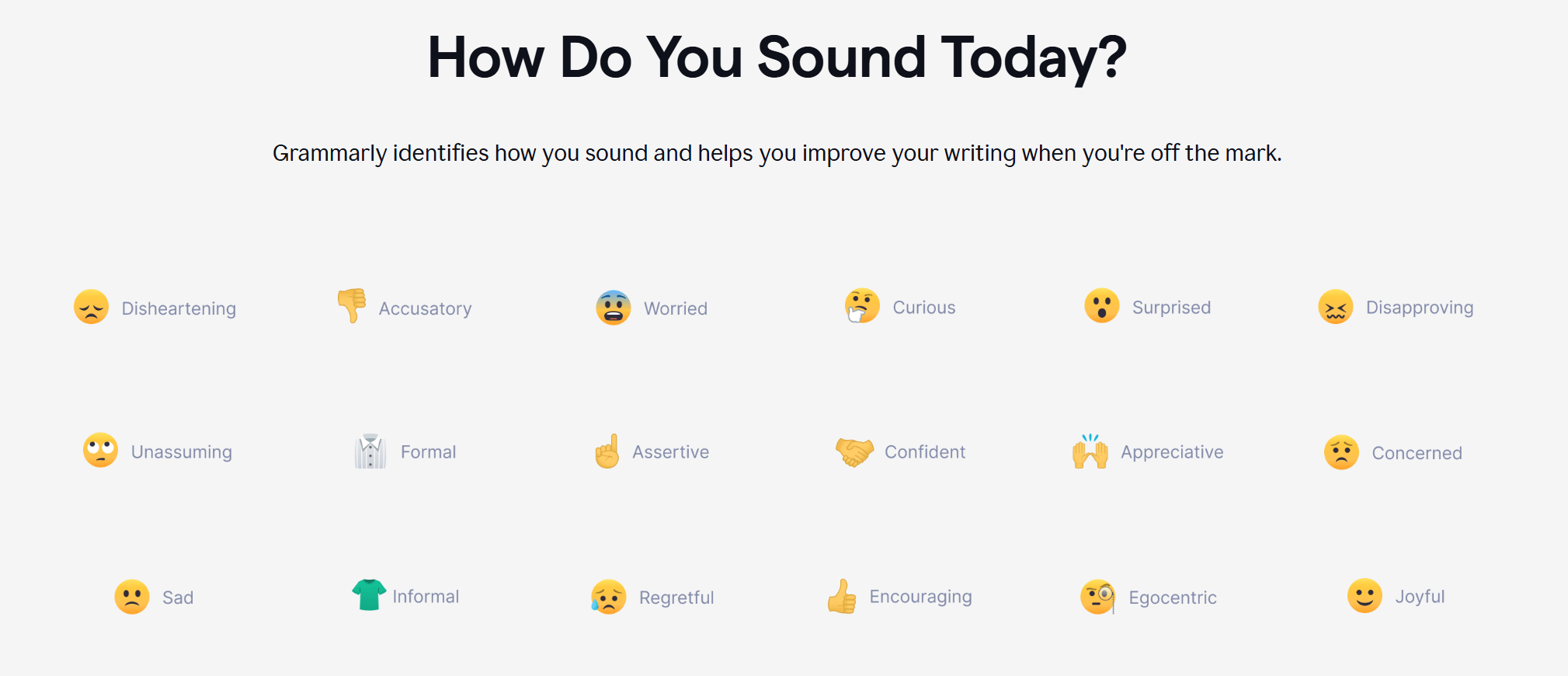
By using AI to get a sense of your audience’s attitude toward your business, you can better gauge how successfully you’re reaching them and what you might need to do differently to cater to their needs and interests. That’s something it’s a lot harder to do on your own.
5. Smart bidding
Most businesses end up using some form of paid advertising. Most often, they use pay-per-click (PPC) advertising, where you bid on certain keywords that you want to target with your ads, and then you only pay when your ads earn clicks. One of the most tedious parts of managing a PPC campaign is bidding, but that’s where we get another business AI use.
Ad networks like Google Ads typically provide various AI capabilities, including “smart bidding,” where you can let a machine learning algorithm make your bids for you. It doesn’t have total control over this — you can set limits on the bids and let the AI know how you would like it to approach the bidding process. Then you can focus on other things while it manages your bids for you.
6. Fraud detection
It’s becoming more and more common for businesses to use AI for fraud detection and prevention purposes. How you apply AI for fraud detection depends on your business and industry.
For example, a financial institution like a bank would likely use it to catch fraudulent transactions and identify perpetrators with facial recognition software.
Even if you’re not a bank, you may still be able to use fraud detection AI software to analyze purchases made on your website and catch any attempts at fraud.
7. Recruitment and HR screening
In the modern world, business leaders don’t have as much time to read through hundreds of applications per position listed online. To remedy high volumes of submissions, companies are using AI for hiring and onboarding employees.
AI can help read applications, connect with prospective employees, and share information about job listings and requirements.
Tools like Kula leverage AI to scan resumes and decide what applicants are the best fit for your company, based on:
- Keywords and phrases
- Skills
- Experience
- And more!
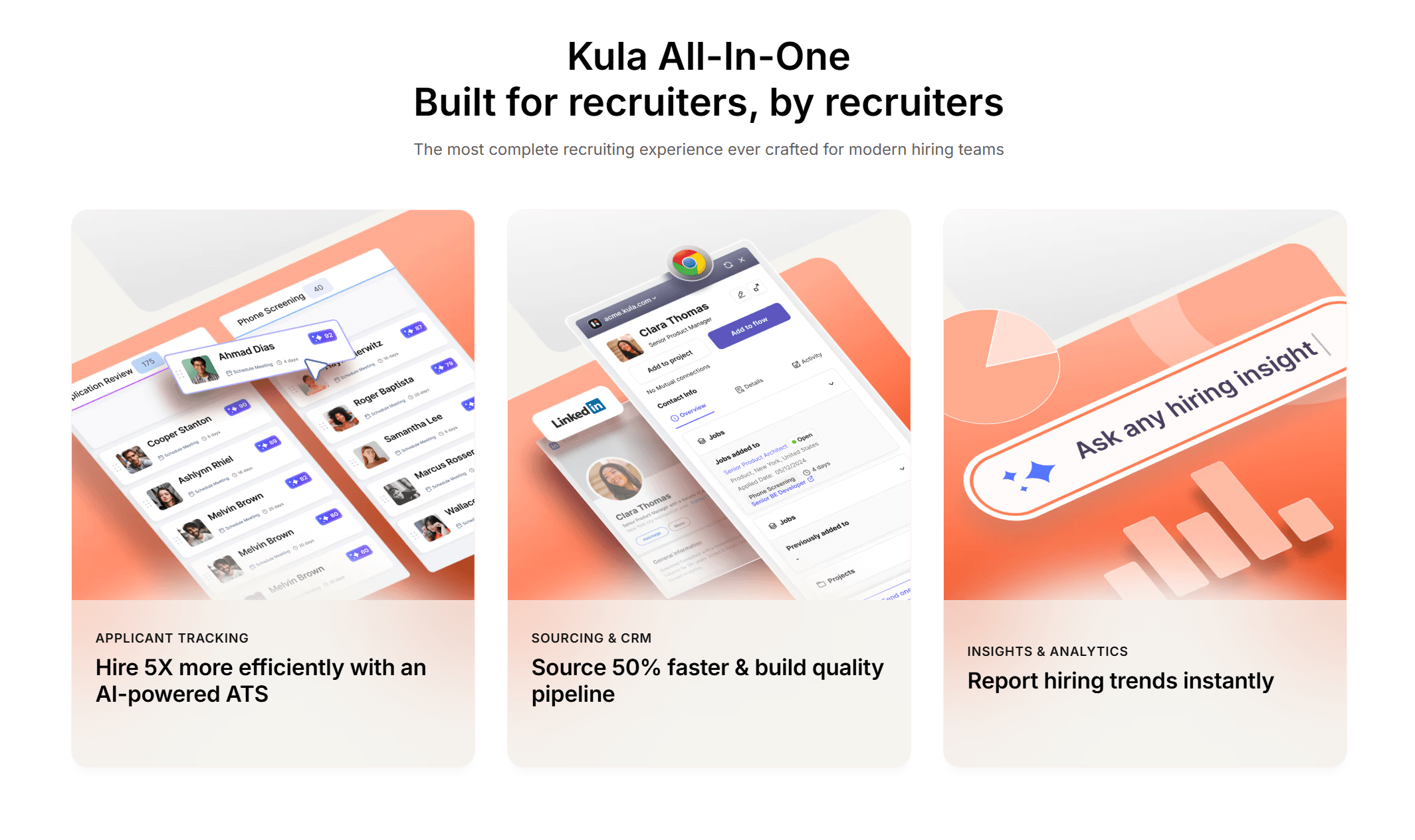
8. Document summarization
Another example of AI for business is condensing documents into shorter, more digestible summaries. These tools take a long document, read through it, parse the meaning and important takeaways, and give you a clear summary in a few minutes.
Businesses can use this type of AI to:
- Share key takeaways with employees
- Refresh their understanding of a document
- Save time on reading when needed
9. Meeting notes and transcription
There are also AI tools that help with documenting virtual or in-person meetings. Think of it like a voice-to-text feature for meetings or customer calls.
Google Gemini is a great example of this use case in action. Gemini allows you to take notes hands-free during the meeting with their AI voice-to-text feature:
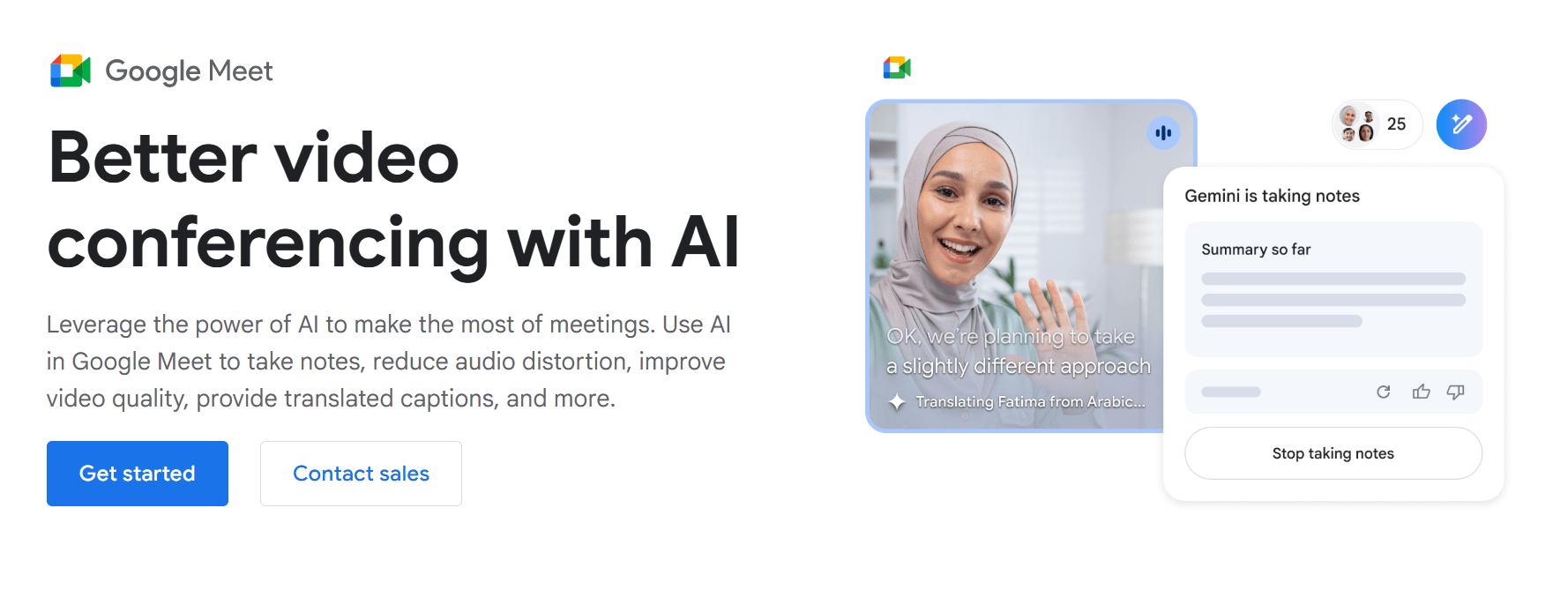
Voice assistants enhances accessibility, productivity, and post-meeting connections. Rather than taking notes manually, you can record and manage meeting summaries with ease by using AI.
10. Industry use cases
There are also specific use cases for AI in business based on your specific industry. Since each business has a unique market, audience, and workflow, finding AI that benefits your particular case is essential.
These examples of how industries are using AI can help you brainstorm new possibilities for AI tools.
Banking
Aside from customer service and the uses mentioned above, banks are automating tasks such as valuation analysis, which reduces the workload of junior analysts.
Ecommerce
Ecommerce giants are adding AI features to help optimize listings and encourage more sales. For example, eBay and Amazon both offer generative AI to assist sellers by automatically completing item descriptions and attributes, streamlining the listing process.
Transportation and logistics
AI can also help transportation and logistics companies improve their route mapping and keep operations moving on pace. In fact, UPS leverages AI to optimize delivery routes and reduce package theft, which enhances operational efficiency.
FAQs about AI in business
Here are the answers to some common questions about using AI in business:
What is the best business use of AI?
There’s no single best use of AI in business, because what qualifies as “best” depends on the unique needs of your business. Having said that, some of the most common AI business uses include:
- Predictive analytics
- Meeting transcription
- Smart bidding
- Customer service chatbots
- And more!
What are some AI business tool examples?
There’s an abundance of AI tools available to businesses. Some notable examples include:
- ChatGPT
- Perplexity
- Otter AI
- Grammarly
- TeamAI
- And more!
Of course, the exact tools that you use should depend on the unique needs of your company.
Is AI the future of business?
This is a question many businesses are asking, but in truth, it’s far too broad and speculative to answer fully here. That said, AI definitely has a big role to play in the future of business. How big that role is remains to be seen. But there’s no question that businesses are already widely using AI in their processes, and that trend will likely only continue to grow in the coming years.
So, AI might not be “the future” of business, but it’s definitely at least a major part of that future.
Apply AI examples in business with help from WebFX
Want some help harnessing these business AI uses in your marketing? WebFX can help!
With our AI marketing services, we’ll help you integrate AI into your campaigns, giving you a competitive edge over other businesses leveraging AI in your field.
You can also access our proprietary marketing software — RevenueCloudFX. This AI-powered tool can help with your lead generation, data analysis, and more.
Interested in partnering with us? Just give us a call at 888-601-5359 or contact us online today!
-
 Matthew Gibbons is a Senior Data & Tech Writer at WebFX, where he strives to help businesses understand niche and complex marketing topics related to SEO, martech, and more. With a B.A. in Professional and Public Writing from Auburn University, he’s written over 1,000 marketing guides and video scripts since joining the company in 2020. In addition to the WebFX blog, you can find his work on SEO.com, Nutshell, TeamAI, and the WebFX YouTube channel. When he’s not pumping out fresh blog posts and articles, he’s usually fueling his Tolkien obsession or working on his latest creative project.
Matthew Gibbons is a Senior Data & Tech Writer at WebFX, where he strives to help businesses understand niche and complex marketing topics related to SEO, martech, and more. With a B.A. in Professional and Public Writing from Auburn University, he’s written over 1,000 marketing guides and video scripts since joining the company in 2020. In addition to the WebFX blog, you can find his work on SEO.com, Nutshell, TeamAI, and the WebFX YouTube channel. When he’s not pumping out fresh blog posts and articles, he’s usually fueling his Tolkien obsession or working on his latest creative project. -

WebFX is a full-service marketing agency with 1,100+ client reviews and a 4.9-star rating on Clutch! Find out how our expert team and revenue-accelerating tech can drive results for you! Learn more
Try our free Marketing Calculator
Craft a tailored online marketing strategy! Utilize our free Internet marketing calculator for a custom plan based on your location, reach, timeframe, and budget.
Plan Your Marketing Budget
Table of Contents
- 1. Customer service chatbots
- 2. Content creation
- 3. Predictive analytics
- 4. Sentiment analysis
- 5. Smart bidding
- 6. Fraud detection
- 7. Recruitment and HR screening
- 8. Document summarization
- 9. Meeting notes and transcription
- 10. Industry use cases
- Apply AI examples in business with help from WebFX
- FAQs about AI in business

See AI Marketing in Action
Explore how WebFX helped a regional brand get discovered in AI search experiences — proving what’s possible with today’s AI-driven marketing!

Proven Marketing Strategies
Try our free Marketing Calculator
Craft a tailored online marketing strategy! Utilize our free Internet marketing calculator for a custom plan based on your location, reach, timeframe, and budget.
Plan Your Marketing Budget
What to read next




